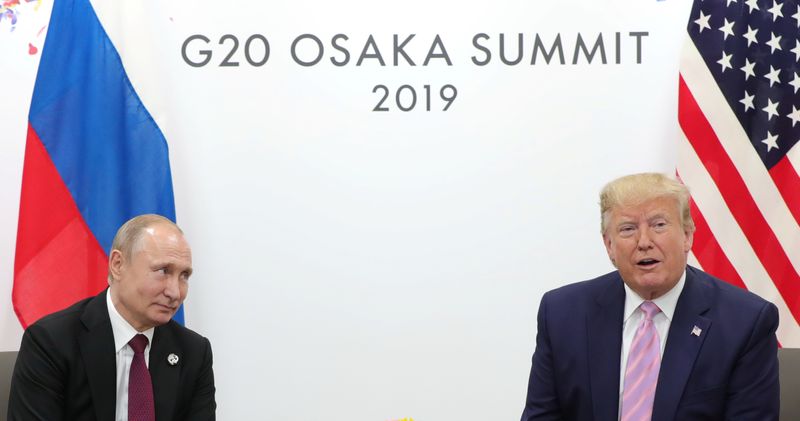VLADIVOSTOK, Russia (Reuters) - Russian President Vladimir Putin said on Tuesday that the prosecution of former U.S. President Donald Trump was politically motivated and demonstrated the "rottenness" of the U.S. political system.
Trump, the front-runner for the 2024 Republican presidential nomination, is facing a series of criminal cases in which he is charged, among other things, with trying to overturn his 2020 presidential election defeat by Joe Biden.
He has pleaded not guilty, while Biden, who is seeking re-election next year, has kept silent about the proceedings against his opponent.
Putin said what was happening to Trump was good from Russia's point of view.
"It shows all the rottenness of the American political system, which cannot pretend to teach others about democracy," he said at a forum in Russia's far eastern city of Vladivostok.
"Everything that's happening with Trump is politically motivated persecution of one's political rival, that's what it is. And it's being done before the eyes of the U.S. public and the whole world. They've simply exposed their internal problems."
Putin continued: "In this sense, if they are trying to fight us in some way, it’s good, because it shows who is fighting us. It shows, as they said back in Soviet times, 'the bestial face of American imperialism, the bestial grin'."
As president, Trump was investigated for possible collusion with Russia but an investigation by special counsel Robert Mueller did not find sufficient evidence that Trump's campaign had coordinated with Moscow to influence the 2016 election in which he defeated Hillary Clinton.
Putin said the idea that Trump had special ties with Russia was "complete nonsense".
He also said significant changes in the U.S.-Russia relationship were unlikely regardless of who wins the 2024 U.S. election because the administration was "hammering into people's heads" that Russia was an existential adversary.

"No matter who is elected, the vector of anti-Russian U.S. policy is unlikely to be affected," he said.
Relations between Moscow and Washington, already strained during Trump's presidency, have plunged to post-Cold War lows under Biden following Putin's decision in February 2022 to send tens of thousands of troops into Ukraine, triggering sweeping Western sanctions and Western military aid to Kyiv.